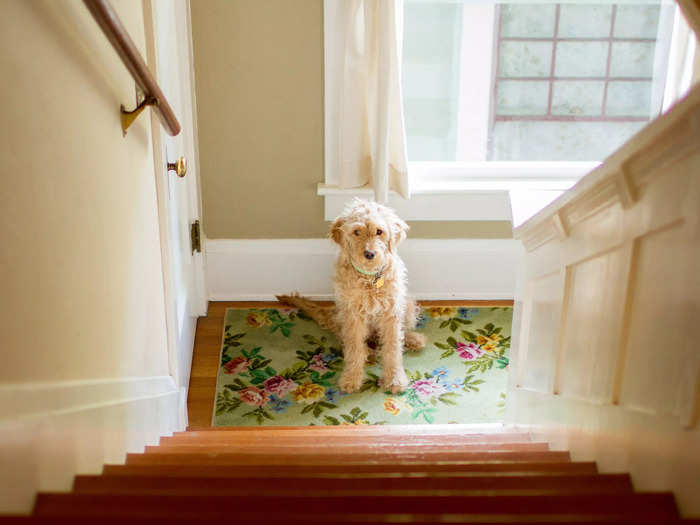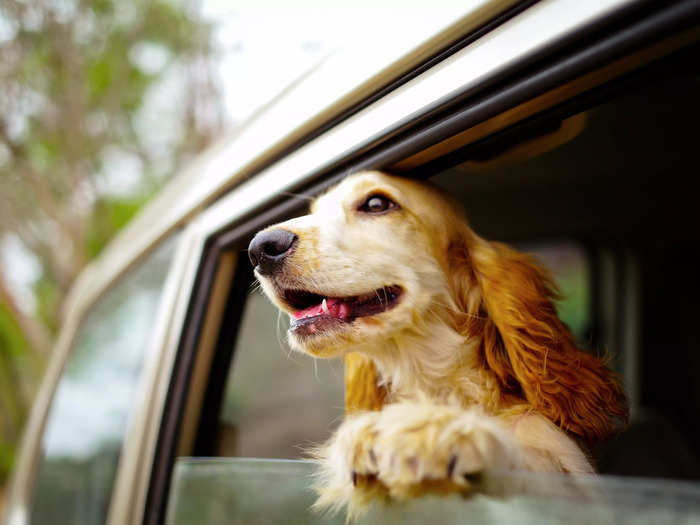6 tips on how to care for a senior dog, according to the chief veterinarian at Petco

- As dogs became seniors their needs change which requires special care.
- Dr. Whitney Miller, the chief veterinarian at Petco, gave Insider tips on how to care for your aging pup.
All dogs require care, but as your dog ages, their needs can change drastically.
This is for a variety of reasons, the main being the physical and cognitive declines that occur.
According to VCA Animal Hospitals, a small dog becomes a senior between the ages of 11 and 12, a medium dog at 10, a larger dog at 8, and giant breeds dogs are considered seniors at 7.
With this in mind, Insider reached out to Dr. Whitney Miller, the chief veterinarian at Petco, for her expert suggestions.
Here are six tips from Miller that will help improve the life of your senior dog.
1. Exercise and play are essential for dogs of all ages.

The physical capabilities of a senior dog are specific to each dog's health and ability, however, just because a dog is older, doesn't mean it doesn't need a good amount of exercise and play, according to Miller.
"We might kind of lean towards just letting them rest because they slow down a bit, but it's super important for them to have some level of exercise, even if it's just a short walk three to four times a day just to make sure that they're getting that outdoor time and exercising those muscles," Miller told Insider.
According to Miller, senior dog owners should consider swimming, which is less strenuous on the joints than other types of exercise.
2. Dogs' diets and appetites change with age, and weight gain becomes a greater concern.

Like humans, as dogs grow older, their dietary requirements change.
To meet these needs, Miller recommends a dog food specially formulated for senior dogs that considers a slower metabolism and supports a healthy weight.
Weight is important to monitor because older dogs tend to be more sedentary. A study conducted by Banfield Pet Hospital and published by the American Veterinary Medical Association found "the lifespan of overweight dogs was up to 2 1/2 years shorter, on average, than the lifespan of dogs with a healthy body weight."
However, it's essential to acknowledge that appetites vary from dog to dog.
"I would say that senior pets can, can definitely kind of veer one way or the other," Miller said.
She added that it's common for some senior dogs' appetites to slow down while others become "chow hounds" with age. Appetite can vary based on "underlying health issues" and "environmental changes," according to Miller.
3. Miller says there are ways to make sure your home is safe and secure for a senior dog.

Miller says senior dogs need a supportive home environment in order to thrive. In order to make that happen, dog owners might need to customize certain aspects of the living space to accommodate their furry pals.
Miller advises an orthopedic bed for maximum comfort and support.
"If they're laying on, either hard surfaces or laying a lot on surfaces that don't have a lot of support, you will start to see those pressure sores or even pain in certain areas," Miller said.
If your senior dog has mobility issues, Miller suggests investing in nonslip mats to place in high-traffic areas of your home as well as booties for your dog's paws to help with grip.
If your older dog likes to lay on the furniture, ramps or stairs are essential. Miller told Insider dogs can experience slipped back discs because they can no longer safely jump on and off the couch.
All of these small changes will help your dog feel safe and supported as they venture into old age.
5. Cognitive decline is common in older dogs, and there are ways to ease their discomfort.

Cognitive dysfunction often goes hand in hand with physical dysfunction in senior dogs, so ensuring your home is equipped to support your dog's mental and physical needs is important.
A study published in the National Library of Medicine found that between 14% and 35% of dogs over the age of 8 experienced canine cognitive dysfunctions or dog dementia, as it's often called.
However, Miller says there are medications explicitly made for cognitive dysfunction that can be prescribed by a vet, in addition to treatments for dogs more prone to anxiety and restlessness.
For those conditions, there are over-the-counter hemp-based anxiety relievers.
Miller also suggests a ThunderShirt, a tight-fitting garment a dog wears while stressed, and making sure your dog has a safe space like a kennel they can go to when anxious.
Another factor Miller says dog owners should consider if their pet is experiencing anxiety is hearing and vision loss.
"Those kind of things can also trigger some anxiety for dogs that obviously have been used to certain sounds or seeing certain things throughout their life, and maybe they're starting to lose some of that," Miller told Insider.
4. Traveling with a senior dog can be precarious, but there are things you can do to make your senior pet more comfortable in the car.

According to Miller, safety is critical, and she recommends dog owners find a safety belt or harness to ensure their furry friend is secure on the road.
An excellent way to make your dog comfortable during a long car ride is to place a dog bed in the backseat if the size of your car permits. This way, your dog is in a familiar, yet comfortable, environment for the duration of the ride, Miller told Insider.
Miller also advises owners to watch for motion sickness, which can occur in dogs of all ages, but more so in seniors experiencing cognitive dysfunction.
Vets can prescribe motion sickness medication if needed, Miller said.
7. Visiting the vet more than once a year is a paramount part of senior dog health.

All of these tips for senior dogs are great, but perhaps, the most important and often overlooked suggestion is taking your senior pet for regular vet visits.
A healthy adult dog should make a vet visit at least once per year, however, senior dogs are a different story.
Miller suggests taking your senior dog to the vet at least twice a year — a recommendation she sees becoming more common among vets.
"That is really how, the health issues that senior pets are at risk for, how we're gonna catch them earlier on and be able to get the pets on treatment, Miller told Insider. "With the goal of extending their life even more."
Popular Right Now
Advertisement